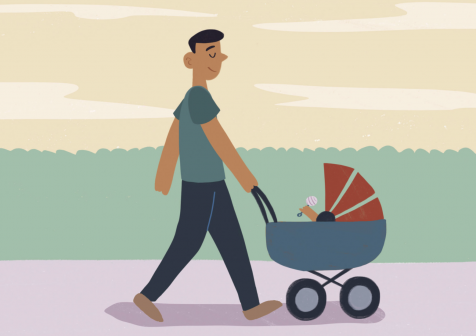While I was doing research for my next blogpost I came across an article from the Harvard Business Review called “Brave Men Take Paternity Leave”, I checked the date and saw that is was from 2014. I wonder, in 2020, are men still considered “brave” to take the leave given to them?
There is still no official standard set by the international labour organization with regards to Paternity leave. However, in 2009, the ILC Resolution sent out a call to action for governments to create more “adequate policies allowing for a better balance of work and family responsibilities for both women and men in order to allow a more equal sharing of these responsibilities” The ILO recommends that policies including “paternity and/or parental leave with incentives to encourage men to take up such leave”.
This is important as there has been research done that shows the positive correlation between men taking leave of 2 weeks or more after the birth of child helps to develop stronger bond and allows them to be more “involved with their young children”. Additionally, if corporations want to work on creating a better and more appealing corporate culture from an employee branding perspective, we need to bring men into the conversation when it comes to gender equality in the workplace.
Although many companies are now offering paternity leave, many male employees aren’t taking the full allotted time due to social stigma or fear of discrimination in the workplace. Nordic countries are hailed as pioneers of fair and ground-breaking family leave policies. In Denmark, regardless of industry, a father is entitled to take “two weeks of paternity leave during the first 14 weeks after the birth of the child”.
The Danish government gives 32 weeks of leave which can be split freely between the parents. This allows flexibility to employees to plan if they want to divide the care responsibilities or work together. The reality is much different, studies show that Danish men only take 10% of the parental leave in the country. What is surprising is although they have impressive governmental policies put in place, the top 2 reasons men do not take full leave is social stigma and financial reasons. This a common theme globally where men are scared to get passed up for promotions or “appear that they are not working”. The 2nd reason is one that we will explore in more detail in the next blog post, economic reasons. We will investigate the topic of parental leave funding, the types of funding provided by governments and corporations.
Now that we have understood the two major obstacles for future and current fathers. I hope that I have inspired you to support future and current fathers. Positive reinforcement from the employer side is crucial in creating a company where employees feel they can grow professionally and personally.
What has your experience been? If you aren’t a father yet , what are your questions or concerns? If you are a woman , how do you feel about longer paternity leave?
If you would like to learn more about Paternity Leave, here are some interesting podcasts to keep you company during your day.
Vox- The Impact
Denmark’s Paternity Leave Problem
https://podcasts.apple.com/us/podcast/denmarks-paternity-leave-problem/id1294325824?i=1000425790707
BloombergMarkets -What’d You Miss ? This Week
Alexis Ohanian’s Push to Make Paid Paternity Leave a Right
Thanks for reading!
Nisha
Sources:
https://www.vox.com/podcasts/2018/12/14/18136315/denmark-new-fathers-paid-leave-paternity
https://medicolink.com/parental-leave-in-denmark/
https://www.theguardian.com/us-news/2020/jan/29/alexis-ohanian-paternity-leave-male-success-these-things-are-not-mutually-exclusive
https://hbr.org/2014/07/brave-men-take-paternity-leave
https://www.ilo.org/global/topics/equality-and-discrimination/maternity-protection/publications/maternity-paternity-at-work-2014/lang–en/index.htm



Great post and complety agree, Fathers are as essentials as mom’s.
The part about Denmark is a very interesting insight, I’ve lived there for 3 years and have noticed that paternity leave is not that common.
I would think also it is an important factor, that couples have babies at a young age. Many times woman give birth 1-2 years after university, so man might feel the pressure, even more, to provide for their family and afraid that they might lose promotions if they take full-time paternity leave.
Are you planning on touching upon the age as a factor in this topic? Might be interesting to explore!
Hello Nisha, really interesting post! I was wondering, do you know where Switzerland states in the context of paternity leave? I heard of fathers reducing their workload in order to stay one or two days at home with the kids, I find it really positive and encouraging.
Interesting topic Nisha. One company I did an internship with was very family-friendly. After I started my boss went on maternity leave for a total of 1,5 years (because she had some rest time from her previous children) and another team lead took a one month paternity leave. I also think fathers should really take the time to bond with their newborn because those early months pass by too quickly. 🙂